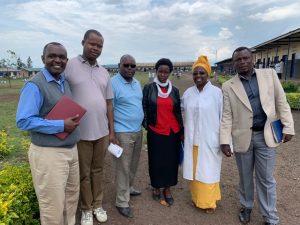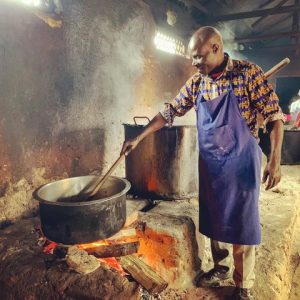Justice and Dignity in a Rwandan School
Others, EducationContributed by: Wellspring Foundation for Education
Written by Andy Harrington
A few weeks ago I found myself in a school in Rubavu, a district of Rwanda, right on the border with the Democratic Republic of Congo. I was there because of a letter.
I received it from a group of parents who represented schools in the area. It was signed by 74 of them though it had been written by a parent of this school, GS Muhato. It’s a public school in one of the poorest parts of Rwanda, an area that among other issues, is struggling with sky high school dropout rates, high levels of gender-based violence and incidences of human trafficking. The school has over 1,300 students and is trying hard to provide an education with a lack of resources, in a system that to say the least, isn’t as functional as it should be.
But why had I received the letter?
Nearly two years ago the Wellspring Foundation, who I have the privilege to lead, had started working in the school to help them develop what we call a vibrant school community, one where no child is left behind in the quest for a quality education. As part of our work, we know we have to work with parents and engage them in their children’s schooling. Yet, in a place where there is a daily struggle to survive, this isn’t easy to do.
When you are materially poor, trying to find work, to put food on the table, to just exist in tough conditions, takes all your energy. So, asking you to find time to get engaged in your child’s education, especially when you have a large family as so many do, is asking a lot. As a result, many parents don’t even know the name of the school the children go to and don’t really comprehend the necessity of educating a child, especially a girl child, when all they see is a future of poverty. They don’t feel their voice counts because they don’t feel they have anything to give.
The Psychological Impact of Poverty
So often, people who are poor don’t think they can make a difference. Many don’t feel they have what we call ‘agency’ the power to effect change into their situations. As well as being resource poor, they can be dignity poor. And that leads to an unending cycle of poverty and brokenness that perpetuates itself in future generations.
Over a decade ago in a study called “Voices of the Poor” the World Bank collected the voices of more than 60,000 poor women and men from 60 countries, in the largest effort yet to understand poverty from the perspective of the poor themselves. Surprisingly, one of the biggest findings wasn’t about the lack of finance, but about the impact on them psychologically, and the study chronicles the struggles and aspirations of poor people for a life of dignity and worth. Commenting on the study, Steve Corbett and Brian Fikkert state:
“If you ask people who live in low-income countries, they by and large describe their condition in psychological and social terms. While they recognize their material lack, they talk more about things like shame, inferiority, powerlessness, humiliation, fear, hopelessness, depression, social isolation, and voicelessness.” 1Steve Corbett & Brian Fikkert, When Helping Hurts: How to Alleviate Poverty without Hurting the Poor … And Yourself, [Moody Publishers, 2009] p. 53.
Transformation Through Engagement

The letter I received from those parents talked about this. They told me how they had not realised how they could help their children have a better future by participating in their education, how they thought they had no voice, no resources, no agency. Yet it went on to say how that had changed since they had engaged in our Asset Based Community Development program, which helps them to see the assets they have, the way they can make change and crucially, that they are valuable and important people in their own right. We
help them see how they can make a difference, not just in education, but in every aspect of their lives.
The letter talked of the projects they had undertaken and the transformation they had experienced. It talked about how they now felt they counted and that they had something to give. It was a letter of thanks that deeply touched me.
I also heard from our team that they weren’t sure it would reach me and that they didn’t expect a response. Yet for me, they are some of the most important people I know of. So, I went to the school. And it was an utterly brilliant day.
I met with parents there and we rejoiced together, thanking God for how He had brought us together and made us one. They showed me the kitchen they had built and the farm they had created to feed the children so that they had food at the school, because who wants to learn maths on an empty belly? They showed me classrooms they were building by using local materials so they could ease overcrowding. They talked with me about the way they had reduced dropout in the school to almost zero by working with the children and the teachers to show kids that they counted, that they could have a future. We talked about the plans they were working on, all happening because of the work we had done to mobilize them and show them that they had a voice, assets and a role in their children’s education.

Discovering Dignity and Self-Worth
And the result? Joy! Dignity! Worth! An understanding that they counted and that they were valuable. A belief that they could change not only their children’s destiny but their own. They were proud of what they had accomplished as a community and I found myself thinking that if only parents in my country could be this engaged.
Helping people find justice, worth and dignity is in our mission statement at Wellspring and is key to what JustUs is all about. It’s not doing it for people, because that just creates dependency and even less worth. It’s helping people understand they have a voice, they have power, they can make a change. The parents of GS Muhato have done that and they walk tall and with dignity.
I came away inspired, humbled, challenged and deeply, deeply thankful to be involved in this work, but also having learned a valuable lesson. I don’t have to have all the answers. For when we work together and join hands with God to create environments where people count, are loved and are treated justly, amazing things can happen, things we don’t even plan for.
May the parents of GS Muhato be an example to us all, as we all live into the justice, worth and dignity that God desires for us and as we try to “act justly, love mercy and, walk humbly with your God” [Micah 6:8]
Footnotes
| 1. | ⇧ | Steve Corbett & Brian Fikkert, When Helping Hurts: How to Alleviate Poverty without Hurting the Poor … And Yourself, [Moody Publishers, 2009] p. 53 |

